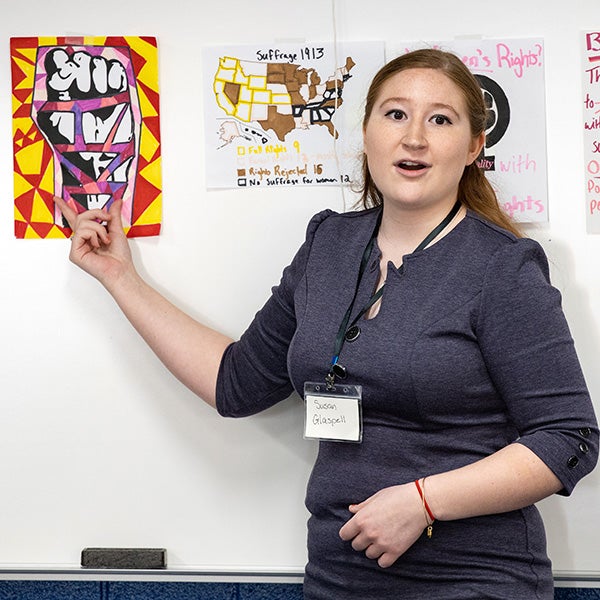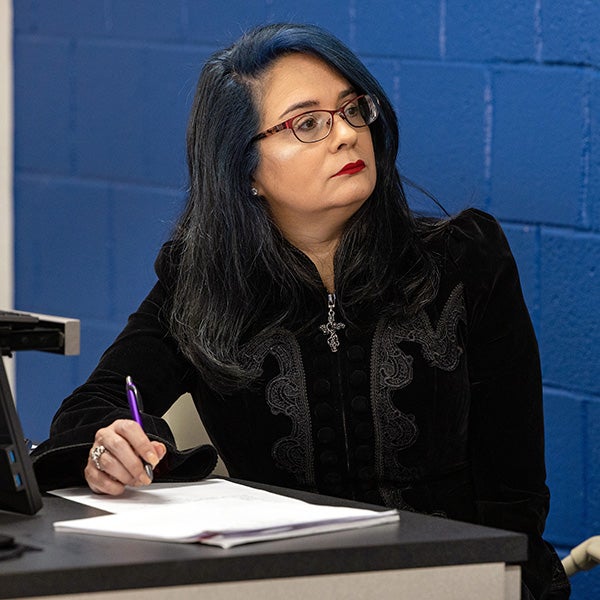ECU English students learn skills through a novel role-playing game
East Carolina University professors often implement unique methods of teaching to help students learn course materials. This semester, Dr. Angela Raper, a teaching assistant professor in the Thomas Harriot College of Arts and Sciences Department of English, is using a historical role-playing game to teach three, freshman-level writing foundations courses.
Raper is using a Reacting to the Past active-learning game designed for higher education, specifically the Greenwich Village 1913 game. She first learned about this novel teaching method at a workshop hosted by Dr. Kirstin Squint, Whichard Distinguished Visiting Professor in the Humanities.

Sarah Fresquez gives a presentation during a role-playing class in Bate Building. (Photos by Rhett Butler)
“As both a creative writer and as someone who has played role-playing games most of my life, I was intrigued by the game-based pedagogy, and I wanted to try the full-length game, which can span weeks, in my own classroom,” said Raper, who has been at ECU since 1994.
“I thought it would be an engaging way for the students to practice some of the fundamental elements of rhetoric, such as learning how to make conscious choices about how to address your audience,” she said.
Class sessions are run by students and are advised by Raper, who grades their oral and written work. Roles and games do not have a fixed script or outcome. While students observe the philosophical and intellectual beliefs of the historical figures they play, they must find their own way to express those ideas in papers, speeches or other public presentations.
“When the game was first introduced, a lot of us in the class were skeptical about playing a game instead of the typical essay-based curriculum,” said freshman Honors College student Sarah Fresquez. “As people started making speeches based on their character beliefs, I noticed most of my classmates and myself were very engaged.”
Raper begins some of the game classes dressed in period costume and may play contemporary music or show images to set the mood. Throughout the game, students choose to create posters and flyers, write and read poems, or dress up to act out performances.
“As they take on historical roles, her students are learning to write and speak convincingly to diverse audiences. By traveling to the past, they are shaping their futures at ECU and beyond.”
–Dr. Marianne Montgomery, department chair and associate professor of English
“Reacting to the Past puts the responsibility for the learning in their hands because the more they put into the game, the more they’ll get out of it, and I hope they’ll be engaged by the more active learning environment,” said Raper.
Fresquez plays the character Susan Glaspell, who forms a new Bohemian faction during the historical suffrage and labor movements. A focal point in the game is women’s rights in marriages, so Fresquez used her character’s troubled marriage background to talk about topics considered to be taboo in 1913, including the ability for wives to own property, to divorce their husbands and to promote contraceptive methods.

Assistant professor Angela Raper, dressed in period clothing, listens to Fresquez give a presentation during her role-playing class.
“The more interactive style gives more opportunity to critically think about both what others believed and how they aligned with my own character,” said Fresquez.
To prepare for the speeches, students must do background reading and make sure they thoroughly understand the material to accurately and effectively answer questions proposed during class.
“After the speaker presents, those listening give arguments and ask questions that challenge the speaker and develop more effective communication skills for everyone involved,” said Fresquez. “What makes this role-playing style of curriculum so interesting is the fact that you are writing your own story and living it. Everyone is learning and it is a great environment in which it feels safe to interact without judgment.”
Dr. Marianne Montgomery, Department of English chair and associate professor, said: “I am excited that professor Raper is the first instructor to use the innovative Reacting to the Past method at ECU. As they take on historical roles, her students are learning to write and speak convincingly to diverse audiences. By traveling to the past, they are shaping their futures at ECU and beyond.”
For additional information about Reacting to the Past engaged learning methods, visit the Reacting to the Past website.
-by Lacey L. Gray, University Communications
